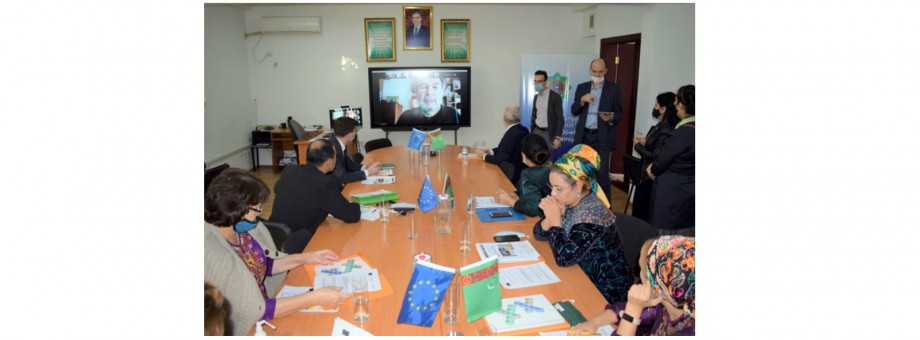MASTER'S PROGRAMME IN PUBLIC ADMINISTRATION: STUDYING INTERNATIONAL EXPERIENCE

An online seminar held recently within the framework of the joint EU-Turkmenistan project “Support for Public Administration Capacity Building in Turkmenistan” brought together specialists and professors of the Academy of Civil Service under the President of Turkmenistan.
The main goal of the seminar is to assist the Academy of Civil Service in the development of a Master's Programme in public administration, based on the best practices of the leading countries of Europe and the CIS and taking into account the national characteristics and priorities of the socio-economic development of Turkmenistan.
The Master's Programme in Public Administration is an interdisciplinary programme that combines training in the development and implementation of public policy, solving problems at different levels of government, and improving the efficiency of organizations and institutions of public administration.
Based on this, MPA programmes study public administration, HR management, macroeconomic theory, statistics, budgeting, communications, ethics, and political analysis.
Opening the seminar, Mr. Klaus Erdmann, an international expert from Germany presented the experience of a number of foreign countries used in the development and implementation of master's courses in public administration.
Seminar participants exchanged views on the issues related to the inclusion of certain academic disciplines in the Master's Programme.
Taking into account the importance of the Master's Programme in Public Administration, representatives of the Academy of Civil Service emphasized the importance of including a number of disciplines in the curriculum that will contribute to the improvement of knowledge, improvement of managerial and analytical skills of students. Among them are:
• digital management of the economy;
• modern mechanisms and technologies of public administration;
• state management of foreign economic activity;
• management of logistics centers;
• management in the social sphere;
• regional administration.
In conclusion of the seminar, representatives of the Academy of Civil Service underlined the significance of developing cooperation within the framework of a joint project with the EU to develop the curriculum Master's Programme in Public Administration, using innovative approaches to teaching based on interactive methods and digital resources.
"A distinctive feature of training candidates for a master's degree, along with the development of managerial, economic and general humanitarian disciplines, is a significant amount of legal disciplines, taking into account the increased scope of functions related to law-enforcement activity and preparation of legal documents by state and municipal employees," Ilmet Hanmedov, the Head of the Department of Civil Rights of the Academy of Civil Service said.
Akjemal Burunova, Associate Professor of the Department of Economics and Finance, Candidate of Economic Sciences of the Academy of Civil Service underlined that the Master's Programme in Public Administration was aimed at the development of the system of cultural and professional competencies, allowing to carry out various works in the field of state and municipal management, namely: research, organizational and managerial, administrative and technological, consulting and information and analytical, design work.
In conclusion of the seminar, Babahan Berdyev, National Project Coordinator of the Academy of Civil Service, emphasized that the goal of the Master's Programme in Public Administration was to train highly qualified managers with a wide range of analytical and practical skills. Mastering Master's Programmes at the Academy of Civil Service provides new opportunities for professional growth, both in government and management at various levels, and in business.
Master's Programmes at the Academy of Civil Service are focused on the formation of holistic vision, systematic view of management problems in graduates, combined with the development of applied knowledge in a specific area. Fundamental training will allow a graduate in the future to conduct independent research and practical activities, to develop their professional competencies in a wide variety of areas.
All programs are taught by the leading teachers of the Academy and invited specialists. The content of academic disciplines is based on the latest scientific achievements and developments of the teaching staff of the Academy.
The forms of study in the Master's Programme are diverse. They include both traditional lectures and seminars, as well as modern interactive teaching methods, such as business games, situation analysis, round tables, discussions, group project development, etc.
Upon completion of the programme, students receive a state diploma of higher professional education (Master's Degree).


 NEWS
NEWS